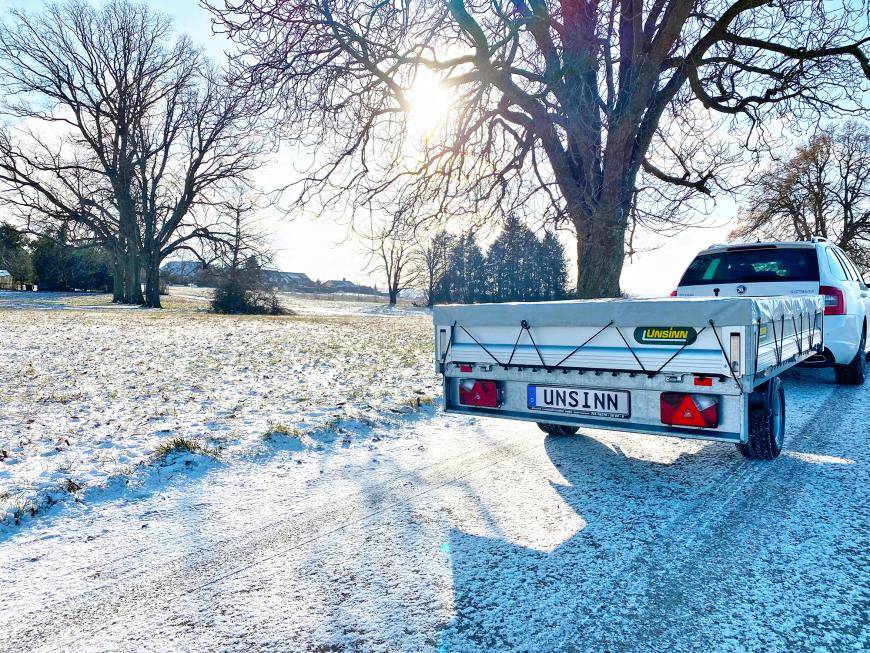
Whether black ice, snowfall, sleet or wet leaves - driving in winter is difficult - even more so with a trailer. To winterise cars, you need to fit winter tyres. But what actually needs to be considered when driving with a trailer in winter? In this article you will find seven concrete tips on how to get safely through the cold season with your trailer:
1. The right tyres for your trailer in winter
Are winter tyres compulsory for trailers? No, unlike motor vehicles, winter tyres are not compulsory for trailers in Germany. Therefore, all-weather tyres marked with M+S (mud and snow) are ideal. UNSINN trailers are all equipped with all-weather tyres at the factory.
If you do not have all-weather tyres, it is advisable to equip your trailer with winter tyres. Especially in winter, when there is ice and snow, it is important to ensure that the trailer's grip is optimal. Winter tyres or all-weather tyres give the trailer significantly better directional stability and grip in curves, thus increasing driving safety.
In addition, you should regularly check the tyre pressure and the tyre tread as well as look for irregular wear and possible cracks in the tyres - especially if you drive the trailer in winter with summer tyres. You can find out more about tyre pressure here.
If you do not use your trailer in winter, make sure that the tyres do not go flat. This can be avoided by jacking up the trailer in winter.
2. Check the lighting of your trailer regularly
When was the last time you checked the lights on your trailer? In the dark season, it is especially important to be seen in road traffic.
We therefore recommend that you check that the rear lights, brake lights, position lights and both turn signals at the rear of the trailer are in working order before every journey. Since many electrical connections are sensitive to cold, special care must be taken. If something is not working, make an appointment at the specialist workshop.
3. Adapt driving style to weather conditions
The weather in winter can lead to dangerous situations, for example slippery roads due to rain, snow and ice. But road salt on the road, darkness and poor visibility also pose risks. Therefore, always adjust your driving speed to the weather conditions and keep sufficient distance to the vehicles in front.
In addition, you should only accelerate gently on slippery, snow-covered roads, steer smoothly and do not brake too abruptly, as the braking distance can be significantly longer. Remember: Anticipatory driving with a trailer in winter is the be-all and end-all.
4. Finding a suitable trailer parking space in winter
Where is the best place for a trailer in winter? It is best to put the trailer in the garage or under the carport to protect it from moisture and snow. If you cannot park it dry, protect the trailer outside in winter with a cover, for example PVC sheeting or a drawbar cover for the trailer coupling. A flat tarpaulin is also ideal, as it provides optimum protection from the weather in both summer and winter.
Caution is advised when parking a trailer under trees, as the falling leaves quickly cause dirt and broken branches and snow chunks can damage the trailer.
To take the weight off the wheels during the winter months, you can jack up the trailer. In addition, care should be taken not to pull the handbrake when parking in winter, but to secure the trailer only with brake wedges.
5. Secure the cargo of your trailer
As braking conditions in winter can be made more difficult by black ice and the like, it is all the more important to secure the load properly. There are a number of different securing devices for this purpose - from nets to tarpaulins to tension belts, ropes or chains.
It is best to load the trailer evenly and make sure that nothing can slip during emergency braking. You can read everything you need to know about securing loads properly here.
6. Cleaning and caring for trailers in winter
If you drive your trailer in winter, you should clean it thoroughly after use. This is because trailers require special care, especially due to snow and road salt, e.g. road salt can form unsightly deposits on metallic surfaces such as salt stains and white rust on hot-dip galvanising.
We recommend cleaning the trailer with water after use. Our tip: It is best to place the trailer at a slight angle so that the water can drain off well. Also, always make sure that the water does not come into contact with the electrical components.
Also remember to lubricate brakes, dampers, hinges, coupling and co. well during the cold winter months and to clean the coupling from the inside. Take a look at the rubber seal and treat it with silicone spray if necessary. Further tips on trailer care can be found here.
7. Check battery on tipping trailers with electro-hydraulics in the cold season
Both the battery and the hydraulic pump of a tipping trailer lose performance at low temperatures. Why? This is because the chemical processes take place more slowly in the cold. The hydraulic oil, for example, becomes more viscous in frosty conditions. Thus, the necessary energy requirement of the pump increases with poorer performance of the battery. To counteract this, it is advisable to regularly charge the battery to 100 % full - in the best case even daily.
If you do not use your tipping trailer in winter, you can also store it free of frost and moisture to reduce self-discharge to a minimum.
Conclusion
If you winter-proof your trailer, maintain it regularly and conscientiously, and drive with foresight, it will be just as ready for use in winter as it is in summer. We wish you a safe journey on cold winter days!